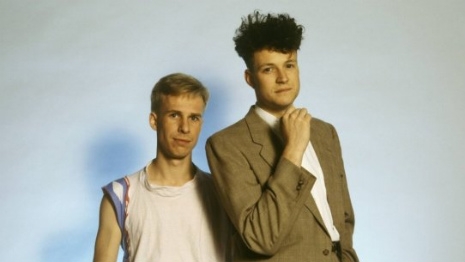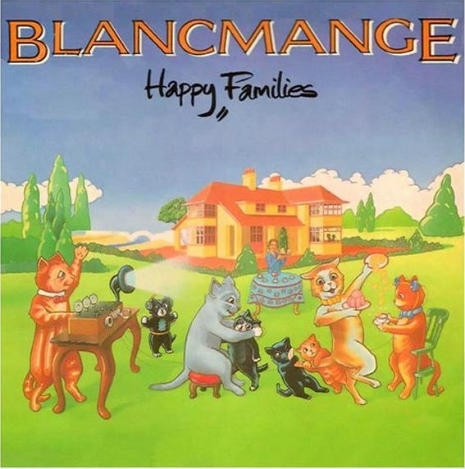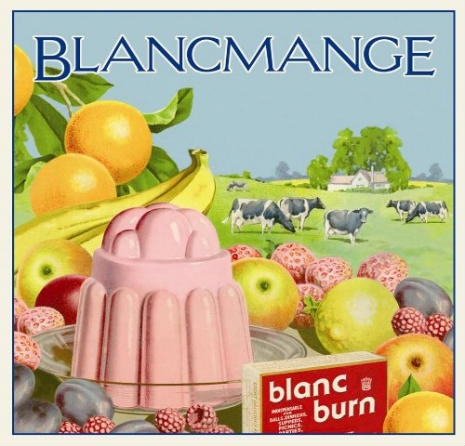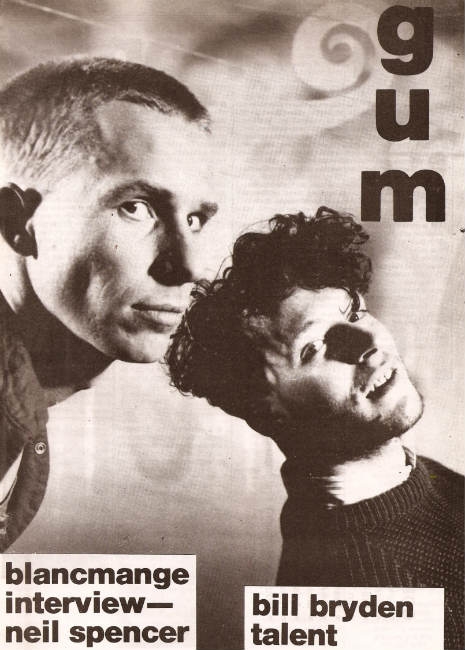
I suppose it was while idling to the sound of John Peel that I first heard Blancmange—the vastly under-rated synth pop duo of Neil Arthur and Stephen Luscombe. This must have been spring 1982 or thereabouts. No doubt I’d have been lying on my bed listening to Peel on the radio, smoking and reading Agatha Christie or Raymond Chandler or the latest Spider-man rather than studying or writing essays or prepping for tutorials—you know the lark. Academia could wait. Life was young and there were adventures to be gained.
This was part of the great attraction to Blancmange. Firstly they had a strange name which Luscombe explains as a kick back against the earnest sincerity of the great coat wearing youth who dominated music at that time and looked like they modeled their lives on the gritty black and white imagery of Anton Corbjin.
The name Blancmange was cheery - as was Arthur & Luscombe’s nickname the Maiden Aunts.
Blancmange was a comforting yet slightly bizarre name. It conjured up the image of a food that is neither jelly nor mousse but actually from the cake family and was originally made from chicken as a remedy for illness. But now best known as some kind of white or pink wobbly gooey dessert made with milk and gelatin. This strangeness fitted perfectly.
So the name appealed and the accompanying music only increased my pleasure. The first two singles—the double A-side “God’s Kitchen”/”I’ve Seen the Word” and “Feel Me,” a twelve-bar dance record, were fresh and exciting. But it was their third single “Living on the Ceiling” that informed the nation and invited Blancmange into the sitting room.
Their music was quirky, original, and fun. The best songs had lyrics that connected with a mood or a feeling that guaranteed a rerun on some subliminal soundtrack.
Luscombe and Arthur were knowingly arty without being pretentious. You knew they enjoyed films with subtitles, had read Camus but probably liked Night of the Living Dead, Derek Jarman, Edith Sitwell, The Crazies and who knows—Knut Hamsun? They also had an album cover that referenced Louis Wain. They were suburban, smart, sophisticated yet somehow quite edgy.

This was more than apparent from their debut album Happy Families, which offered up a superb selection of synth pop that rivaled the best of Soft Cell, Yazoo, with Vince Clark and Alf (Alison Moyet), OMD and The Human League.
From here, Blancmange began an intense three year run of hit singles—released two more albums Mange Tout that is possibly their best, and Believe You Me which never quite took off, though is still worth a listen.
Then (quelle surprise!) in 1986 Arthur and Luscombe decided to take a rest from Blancmange—a break which offered no limit to their time-out.
After a twenty-five year gap, Blancmange last year released their fourth studio album the brilliant Blanc Burn (a pun on Arthur’s hometown Blackburn). It was as if Luscombe and Arthur had never been away. Their latest release received some of the band’s best reviews—hailed as one of the best albums of the year.

To find out more I contacted Stephen Luscombe and asked what he and Arthur had been doing during their two-and-a-half decades of gardening leave from Blancmange?
Stephen Luscombe: After Believe You Me, I continued to work as West India Company with Pandit Dinesh [who played on the albums] following on from our 1984 collaboration Ave Maria’
We worked with a Canadian avant-dance company called La La La Human Steps. Death-defying acrobatic dance moves, very exciting, and an album of the soundtrack was released on EG Records in 1989.’
I also worked with Kate Garner (Haysi Fantayzee) & Princess Julia (doyenne of the London Club scene) on a load of songs. Great fun, but the record company said we were too camp!! How can a pop group be too camp, I ask you.
Then we went to Bombay for six months to write and record with Asha Bhosle, R D Burman, Hope Augustus and Boy George. Started off well but management issues forced the whole thing to come to a grinding halt. A shame, but certainly something to tell the grandchildren!
After our return we scored the soundtrack for a film called Masala by Srivinas Krishna from Toronto.
Very, very funny piece involving three mad Indian families, exploding airliners, Sikh separatists, a missing postage stamp and incompetent Mounties, all overseen by an aged Lord Krishna, played by the wonderful Saeed Jaffrey.
We became friends with Saeed, (also due to a mutual interest in Howlin Wolf and then Captain Beefheart) and recorded an album with him on EG, based on the writings of the Kama Sutra.
From this they went on start a successful career recording soundtracks, jingles and theme tunes for various TV series and a series of award-winning documentaries. This in turn led to their working at the National Theater, on the play ‘Wicked Year,’ as well as running a Summer School at the National Youth Music Theater.
What made you decided to get back as Blancmange?
Stephen Luscombe: Quite honestly, like the majority of our career, it happened by accident.
Neil and I met up one day for a drink, and he said “Fancy doing some more songs for an album?” “Oh okay then” and off we went.
It took a bit longer than expected for various reasons. We both had other paying work to get on with, and I was starting to get a bit poorly [Luscombe has had a serious illness in recent years]. Also, we did the whole thing on our own, from recording, mixing, mastering to artwork and the rest, so that added time.

The way they were…Blancmange on the front cover of ‘GUM’ - a student mag I edited way back when.
Going back to the beginning, how did Blancmange come about?
Stephen Luscombe: Neil and I had rather convoluted backgrounds. I met him at Harrow Art School where a friend of mine was studying.
We had a band, or rather a music workshop called Miru, and Neil was in a similar outfit called The Viewfinders.
We used to play at the bar, dragging washing machines, hoovers, anything we found along the way to the gig. Neil and I started writing, or assembling would be more like it, and the main thing we had in common was having a laugh.
I had, for most of the seventies been involved with sometimes esoteric and strange experimental music, including an orchestra called the Portsmouth Sinfonia, which in retrospect was the nearest thing experimental music got to comedy.
By the time the eighties dawned, I’d had enough of long faces (and equally long greatcoats!) and saw the first wave of post-Punk bands all going down the same route with names like Bleak Industrial Cooling Towers, that sort of thing. The name Blancmange was a reaction to all that, I suppose. I’d already been sacked as Secretary of the London Musicians Collective for being too flippant, but even Steve Beresford and David Cunningham had just had a hit as the Dada/Fluxus-inspired Flying Lizards’with’”Money” so I wasn’t the only one.
What was the moment you decided this was it – from now on you were going to be a band?
Stephen Luscombe: I think the defining moment was when we supported Grace Jones for three nights at the Drury Lane Theatre in 1981.
Watching and hearing that level of showmanship and songwriting must have given us a kick up the proverbial.
In retrospect, it was a good thing. I think we were getting a bit snobbish about not getting involved with the charts. Mind you it was a time when Pop was beginning to become acceptable which helped. Heck, if Kraftwerk did it, why not us?
Take me through your early singles?
Stephen Luscombe: The first single was double A-side, “God’s Kitchen” and “I’ve Seen the Word”. We’d already started to build up a fan-base after extensive touring (sometimes grotty little venues with just Neil’s Dad and a dog as the audience) to the touring twice with Depeche Mode, Japan, and Grace Jones.
Stephen Luscombe: We met our long time collaborator, guitarist David Rhodes on tour with Japan, (the rest of them wouldn’t speak to us ha ha) We were chuffed to bits to hear our first record on the radio!
I’ll always remember being presented with the first pressing of “Gods Kitchen”/ “I’ve Seen the Word” and being thrilled to bits.
A PROPER record with a PROPER record company! ha ha ha.
And we could afford to get a proper synthesiser (Jupiter 8) and I even got my mitts on a Mellotron 400, a real one, they didn’t have samplers in those days. Pigs in shit we were. The next morning we were off on tour with Depeche Mode. We had arrived!!!
Stephen Luscombe: “Feel Me” came next, an electronic twelve-bar dance record! Was that a first? David [Rhode]‘s guitar took that track somewhere else, and soon we had the likes of Rusty Egan coming up to us at the Camden Palace nite club saying he was a big fan. And to think a couple of years earlier they wouldn’t let us in to the Blitz Club [nightclub run by Rusty Egan and Steve Strange].
‘Even more bizarre is the recent Faithless cover! I do think that Harry did a fantastic job, a totally new take. Hope Rusty likes it.
Stephen Luscombe: “Living on the Ceiling” was next. Our manager had the inspired idea of suggesting tabla & sitar as overdubs, and even though the melody line was nowhere near the Sub-Continent, it worked, and off we went to Cairo to make the video - a right old geographical muddle, but hey, it’s pop.
We had just been doing the score to Micha Bergese’s dance piece Business Steps and then came the call that it had gone in at no19 and would we do Top of the Pops tomorrow. Er, no-brainer…
Stephen Luscombe: Neil is the songwriter. My interest is more towards musical textures, production etc. etc. That’s not to say that these roles are set in concrete, for example, the songs “Feel Me”, “Kind” & “Gods Kitchen” all came about as pieces that I had written and then Neil put lyrics to them.
Other times Neil would write the complete piece and then I would put my two pennyworth in. “Living on the Ceiling” started as a song that Neil had written, I had a rhythm and bass and we put them together. Neil also had the melody but played it wrong and we said, “Keep it!”
So it’s all six of one and half of the other so to speak, when its all put together.’
Stephen Luscombe: “Waves” was hard work, but it all turned out right in the end. The video was, well, something else. Neil being sick on a Cornish trawler in a force eight gale at six in the morning. Me dressed as Dracula conducting the Atlantic Ocean, god only knows why. And our poor mermaids stuck on a rock in the same said gale in the middle of January, being so topped up with rum to keep warm that they started to slide inexorably into the sea.
To cap it all, we nearly got thrown off Top of the Pops for replacing our playback track with the album version when—unlike most bands in those days of Music Union hegemony—we had actually re-recorded the thing complete with 24-piece orchestra and some little know-all in the BBC studio control room swore blind it was the same recording. But it wasn’t, as any fule kno.
The last straw was that on the day of recording the show, some jobsworth from Elf & Safety wouldn’t let me have a lighted candelabra on my piano. “But Elton John did last week,” I protested, to no avail. Then he put black gaffer tape at the botttom of the stand. On a white piano. Lovely.’
Stephen Luscombe: As for the Abba track, it was such a beautiful, mournful piece almost to the point of kitsch. It turns out that it was the last ever song that they recorded, and in retrospect, it shows.
‘Agnetha & Frida wrote us a personal letter saying how much they enjoyed our rendition, but us being us left the bloody thing in the pub.
As for the recording, well, even though the song sounded simple, musically it was incredibly sophisticated, and I’ll be eternally grateful to the wonderful Anne Dudley who came in to help with the keyboard arrangements, far beyond my meager skills.
Why did you decide to stop Blancmange in 1986?
Stephen Luscombe: Well we decided to call it a day partly to preserve our friendship (before we throttled each other or worse) and partly because we were worn out and bored.
Our last tour was in the US in 1986 and ironically it was the one of the most enjoyable we had done. We were even pursued by screaming fans down a highway in Los Angeles.
Yet, we had been warned that average life of a pop group was 5 years so I suppose we hadn’t done too badly.
No, they certainly hadn’t and the release last year of the excellent Blanc Burn has rightly put Blancmange back in the charts—introducing this fab duo to a whole new audience. Blancmange have also started touring again. Though unfortunately Luscombe had to withdraw at the last moment due to health reasons, and was replaced by the “wonderful Graham H.” Having attended the concerts Luscombe notes there has seen “a remarkable mix of people at the shows, right from the oldies down to say eighteen, nineteen, twenty-year-old kids. And they know all the words.”
Last month The Very Best of Blancmange, an essential double CD of their greatest hits and tracks was released.
Now with more tours planned and the possibility of a fifth studio album Blancmange look set to continue where they left off. And long may that continue.
Stephen Luscombe: If you asked me back then what I’d be doing when I was pushing 60, never in a million years would I have imagined this.
And how did you get the nick-name the Maiden Aunts?
Stephen Luscombe: Daniel Miller called us the Maiden Aunts, probably because of our original EP title, Irene & Mavis, and possibly because we’d bicker and argue like a pair of old women. Oh well, back to the bath chair….’
Check Blancmange website for news and updates, and The Very Best of Blancmange is available here.